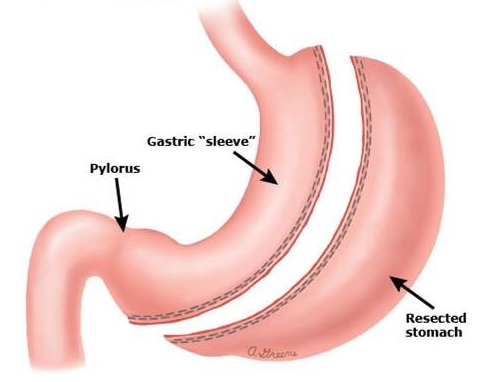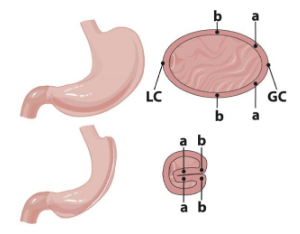What is Gastric Sleeve Surgery (GSS)?
Gastric Sleeve Surgery or Laparoscopic Sleeve Gastrectomy involves surgically removing approximately 75% of the stomach. The remaining 25% of the stomach resembles a small tubular pouch or sleeve.


Figure. Laparoscopic gastric plication. The greater curve (GC) of the stomach is folded inwards several times to create a small gastric tube similar to a sleeve gastrectomy. A band can also be placed at the top of the plicated (narrow) stomach.
This is a highly effective weight-loss surgery and not as complicated as Gastric Bypass surgery, as it involves just one step surgery.
Gastric Sleeve Surgery method is performed laparoscopically with keyhole minimal invasion surgery. The stomach is reduced from approximately 2 litres to a pouch that holds 100 – 150 ml. Over time the pouch can stretch so overeating should be avoided.
Gastric Sleeve is a combined restrictive and metabolic type of weight loss surgery:
- The stomach size is reduced 75% thus limiting its storage capacity.
- There are changes in the gut’s hormones after sleeve gastrectomy surgery with the removal of the stomach’s section that produces most of the hunger hormones.
- Food moves faster down from the stomach to the small intestine.
These gut hormone changes lead to:
- Reduced appetite.
- This process increases the body’s response and causes energy expenditure.
- Reduces fat storage by reduced calorie conversion.
- Improved blood sugar levels.
- Excess weight loss is expected to be 50-75% over a 12-24 months period.
Who is it for?
Gastric Sleeve Surgery is recommended for people wishing to lose a considerable amount of weight for health reasons e.g. obesity related conditions. This includes people with a BMI or body mass index +30, who have tried to lose excess weight with various methods of diet and exercise without success.
Research over the last 100 years has shown that you can live with part or all, of your stomach, as a result, of certain medical conditions. With the bariatric sleeve operation, because the lower part of the stomach (Antrum) is unaffected by the procedure, vitamin B absorption, iron, calcium and foliate levels are maintained.
Nutrient absorption after GSS occurs normally through the gastrointestinal tract and maintains vitamin intake.
Gastric Sleeve Surgery is the most popular form of bariatric surgery currently in Australia.
This procedure has the ability, to produce the desired results for weight loss and better outcomes in reducing obesity related conditions.
Compared to other bariatric surgeries this treatment may have better outcomes when it comes to side effects long term e.g. vitamin deficiencies and internal hernias.
The surgeon will assess your individual medical situation with a face-to-face appointment. However, you must be at least 18 years old with an existing history of weight loss attempts.
First check your current BMI to find your own body mass index and if appropriate for Gastric Sleeve Surgery.
Then it’s as easy as making a phone call to our Sydney Reception number, to see if you are eligible for Gastric Sleeve Surgery or perhaps another type of bariatric surgery e.g., Lap Band Surgery or Gastric Bypass Surgery.
Advantages
- Gastric Sleeve Surgery procedure can reduce obesity related conditions e.g. type-2 diabetes, hypertension, heart disease, stroke, sleep apnoea, knee and hip pain and fatty liver disease.
- GSS Laparoscopic benefits include reduced pain, lower infection risks, a quicker recovery period and fewer surgical complications.
- There is no impact on the small intestine or bowel surgically and digestive functions are maintained.
- The Sleeve surgery is less invasive, and recovery is quicker than other bariatric procedures.
- The procedure achieves loss of excess weight and after, leads to increased energy.
- Improves mobility and as a result, a better quality of life.
Risks
As with any surgical procedure, there is the possibility of potential risks associated with gastric sleeve surgery and although relatively low may include:
- Bleeding and leakage around the surgical edges of the remaining stomach which may result in blood loss or clots.
- Infection around the site of the surgery.
- Post operation pain (support available with pain medication).
- Side effects from anaesthetic.
- Some possible complication of gastroesophageal reflux disorder.
Gastric Sleeve Surgery is an excellent weight loss procedure, however if you are concerned about some of the risks or need help about which treatment is best for you. Our consultants are available to answer your questions with help to choose the right treatment for you.
What to expect
After Gastric Sleeve Surgery certain dietary changes and adjustments to smaller meals are required in order, to maintain the weight loss required. These changes will commence immediately after surgery.
For the first few days after surgery, only clear liquids are taken. Then proceed to pureed foods for a couple of days. This will follow with a longer period of soft foods for 4-6 weeks after surgery. After six weeks the diet can incorporate a more substantial type of food although with a very reduced quantity.
Here are a few tips to achieve this new eating pattern:
- Eat smaller portions.
- Eat slowly.
- Chew each mouthful well.
- Stop eating as soon as you feel nearly full.
- Make sure you are well hydrated during the day by sipping from a glass of water not drinking quickly.
- Remember to take the dietary supplements (Vitamin B12, iron, calcium and foliate) recommended by the dietician.
- Avoid bulky or tough foods eg steak and bread that are hard to digest.
- Avoid overeating because the stomach pouch can stretch resulting in a regain of excess weight.
Post Surgery
This requires 2 days in hospital.
One week off to recover.
After Gastric Sleeve Surgery patients can expect to lose approximately 1 kilogram of weight per week until they reach their desired weight loss goal or healthy range.
This weight loss is aided by a reduction in Ghrelin, a hormone which affects your appetite, so you feel less hungry between meals.
The Sleeve procedure results in the size of the stomach intake reduced to approximately 100 – 150 ml, thus considerably reducing food intake and in turn calories. Good food choices as well as regular exercise are important to maintain an optimum weight. Only a small amount of food is needed for a “feeling of fullness”.
Equally important is the bariatric surgery impact on the gut hormones i.e. Ghrelin (hunger hormone). This suppresses your hunger and appetite thus improving your blood sugar control and sugar levels. Most people can expect to lose 50-75% of excess weight over 12-24 months.
Free Initial Consultation
If you are considering obesity surgery the first step is to contact us for a complimentary consultation.
In this initial conversation we will discuss the SIOS weight-loss journey, including:
- Surgeries available
- Costs and fee structure
- Pre-surgery appointments
- Your hospital stay
- After-care programme
- Support groups and workshops
- Other programmes to help you achieve your healthy weight
This is a private and confidential discussion during which we will also consider your medical history, suitability for surgery and life style. Take the first step towards a healthier life and fill in the online form or call us on 02 8080 4644

